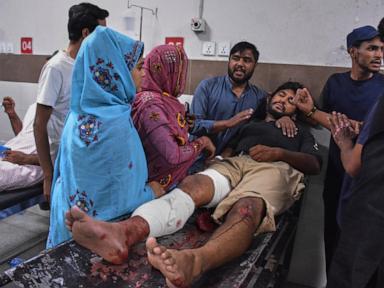A suicide bombing outside a stadium in Quetta, Pakistan, resulted in the deaths of at least **13 individuals** and left **30 others** injured on the evening of **October 3, 2023**. The attack occurred as supporters of the Balochistan National Party were departing from a political rally commemorating the anniversary of the late **Sardar Ataullah Mengal**, a prominent nationalist leader.
The explosion took place near a graveyard adjacent to the stadium on the city’s outskirts. Local police chief **Majeed Qaisrani** confirmed that the body parts of the attacker were recovered at the scene. **Waseem Baig**, a spokesman for a local government hospital, reported receiving **13 bodies** and numerous wounded, with several in critical condition.
No group has claimed responsibility for the bombing as of yet. **Akhtar Mengal**, the leader of the Balochistan National Party and a vocal critic of the government, was unharmed, although many of his supporters suffered casualties. Senior police officer **Usama Ameen** noted that the attack targeted a gathering that was significant for the local community.
Government’s Response to the Violence
Balochistan’s Chief Minister **Sarfraz Bugti** condemned the bombing, describing it as a “cowardly act of the enemies of humanity.” Bugti ordered immediate medical assistance for the injured and called for a thorough investigation to hold those responsible accountable.
In a statement from **Islamabad**, Interior Minister **Mohsin Naqvi** also denounced the attack, suggesting it was orchestrated by “India-backed terrorists and their facilitators” aiming to destabilize Pakistan by targeting civilians. No evidence was provided to support this assertion, and India has consistently denied allegations of involvement in Pakistan’s internal conflicts.
In recent months, Pakistani officials, including Bugti, have repeatedly accused India of supporting both the Pakistani Taliban and Baloch separatist movements, claims that New Delhi has rejected outright.
Context of Violence in Balochistan
Balochistan has long been a region affected by a low-level insurgency, with groups such as the **Balochistan Liberation Army** (BLA) advocating for independence from the Pakistani central government. Historically, these separatist groups have focused their attacks on security forces and individuals from Pakistan’s Punjab region, although civilian targets have also been affected.
Despite claims from authorities that the insurgency has been largely subdued, violence continues to plague the province. For instance, in July 2023, gunmen abducted and killed **nine individuals** after halting two passenger buses on a highway in Balochistan, illustrating the ongoing security challenges. Previous attacks in the region have often been attributed to the BLA, which is classified as a terrorist organization by the Pakistani government.
The aftermath of this latest attack has heightened concerns about security in Balochistan, particularly for political gatherings and public events. As investigations continue, the local and national authorities face increased pressure to ensure the safety of citizens amid persistent threats of violence.
